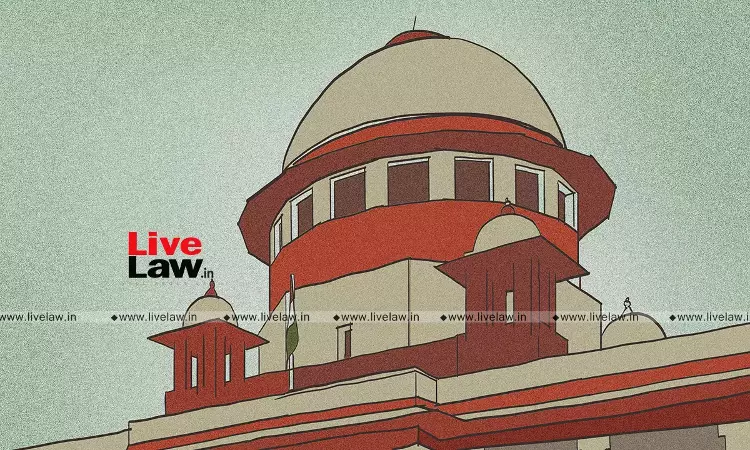- Home
- /
- Top Stories
- /
- Person Working In Society Which Is...
Person Working In Society Which Is 'State' As Per Article 12 Not Government Servant : Supreme Court
Anmol Kaur Bawa
16 Jun 2025 3:15 PM IST
The Supreme Court today (June 16) observed that a person who works in a registered society which is a "State" within the meaning of Article 12 cannot be held to be a government servant.The bench of Justice Ujjal Bhuyan and Justice Manmohan was hearing a plea challenging the order of the Tripura High Court, which upheld the dismissal of the petitioner from a government post as 'junior weaver'....
The Supreme Court today (June 16) observed that a person who works in a registered society which is a "State" within the meaning of Article 12 cannot be held to be a government servant.
The bench of Justice Ujjal Bhuyan and Justice Manmohan was hearing a plea challenging the order of the Tripura High Court, which upheld the dismissal of the petitioner from a government post as 'junior weaver'.
The petitioner, to be eligible, had misrepresented that he was earlier a government employee. The petitioner, before applying as a junior weaver, was working as a crafts teacher at Tripura Tribal Welfare Residential Educational Institutions Society (TTWRES), an autonomous body supported by the Government.
The High Court upheld the dismissal, noting that TTWRES was not a government department but a society and the petitioner could not be considered as a government employee in order to be eligible for the post of Junior Weaver.
The bench refused to entertain the plea and dismissed it, observing that just because 'society' has been construed to mean 'state' under Article 12, it would not make a person working there a government servant.
Justice Bhuyan said: "Society being amenable to Article 12 doesn't make a person working there a Govt servant."
Article 12 gives the definition of "State". State-backed entities, PSUs, co-operative societies, government undertakings etc, have been held to be coming within the sweep of "other authorities" in Article 12.
The petitioner was terminated from the position of Junior Weaver in Weaver's Service Centre, Agartala, a Government of India organization under the Ministry of Textiles.
The grounds for his termination were that he misrepresented the Centre that his earlier place of employment was a government department, making him eligible for the position.
However, an inquiry was done by the competent authority of the Ministry of Handloom and Textiles to his past workplace- Tripura Tribal Welfare Residential Educational Institutions Society (TTWRES).
It was found that TTWRES was not a Government Department and it was run by the Society. This was also verified by the Department of Personnel and Training (DoPT), Government of India.
The petitioner challenged his termination of service in a writ petition before a single judge bench. The single bench held that TTWREIS was not a government department and the petitioner could not be treated as a govt. employee. Additionally, it was also held that the rule of relaxation only applies in case of a person holding a civil post under the Government Department.
The petitioner then challenged the order of the single judge before the division bench of the High Court. The division bench upheld the single bench order while placing reliance on Rule 2(h) of CCS (CCA) Rules, 1965 which states :
(h) "Government servant' means a person who -
(i) is a member of a Service or holds a civil post under the Union, and includes any such person on foreign service or whose services are temporarily placed at the disposal of a State Government, or a local or other authority;
(ii) is a member of a Service or holds a civil post under a State Government and whose services are temporarily placed at the disposal of the Central Government;
iii) is in the service of a local or other authority and whose services are temporarily placed at the disposal of the Central Government;”
Considering the above, the High Court held that "it is crystal clear that a government servant must hold a civil post under the State or Union of India. In view of the said rule, the post of Craft Teacher under the TTWREIS cannot be treated to be a civil post. As such, the petitioner cannot be said to be the holder of a civil post."
The Court also negated the argument that the doctrine of estoppel and waiver would apply in the present case. It reasoned that "the petitioner was appointed against the post of Junior Weaver, subject to the condition that he had to furnish proof that he was a government servant. Later on, though he was appointed on the basis of declaration that he was a government servant but subsequently, it was detected that he was not a government servant for the reason that his previous employer was not a Government Department but it was a society."
It added that any government appointment obtained through misrepresentation was voidable.
"It is settled proposition of law that appointment made on the basis of false information, or to say it otherwise, appointment order obtained out of misrepresentation of material fact shall legitimately be treated as voidable at the option of the employer, which can be recalled by the employer and in such a case merely because the petitioner-employee has been appointed and continued in service for months or years on the basis of such fraudulently obtained appointment order cannot claim or create equity in his favour or any estoppel against the employer."
Case Details: PINTU CHOWDHURY vs. UNION OF INDIA| SLP(C) No. 016733 / 2025



